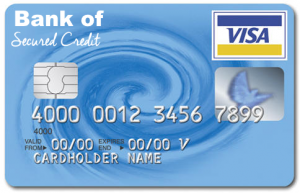
Secured Credit cards are designed to help consumers who lack credit establish a positive credit history. They’re also a fantastic option for consumers who are trying to rebuild their credit as well. Applying for a secured credit card can be intimidating, as there are many terms and conditions that you should be aware of before committing to a card. Deciding whether a secured credit card is worth it or not can be difficult.
What is a Secured Credit Card?
Secured cards are different than unsecured credit cards in that the credit card holder must provide a cash deposit, which is then used as the credit limit. For instance, a secured credit card may require a $300 initial deposit, then this $300 amount becomes the spending limit. This initial deposit is designed to protect the credit card company against consumers who are considered to be a high risk. If you run up charges on the secured card and don’t pay your bill, your deposit will be kept to cover the loss.
What is the Best Secured Credit Card?
The “best secured credit card” for you really depends on your individual situation. There are a couple of very important things to look for, though, especially if you’re using a secured card to build or rebuild your credit. If you are interested in applying for a secured credit card, you have to do some research to ensure that the card you choose is right for your financial situation.
As a general rule, it’s a good idea to stick with secured credit cards issued by well known major credit card companies. Think Capital One, Discover, Citibank, and Wells Fargo. Additionally, your current bank or credit union might also offer secured cards to customers looking to build credit.
The most important step to finding the best secured card is to find a secured credit card provider that will report your activity to the three major credit bureaus. Not all providers will do this, though, and if you use a secured credit card that does not help to improve your credit, your efforts have been wasted.
You also need to pay close attention to the fees and costs associated with a secured credit card. You may find that you may pay a higher fee for a secured card than for a traditional non-secured card. Many providers institute these fees because consumers with bad credit or no credit are a risky proposition to their bottom line. These higher rates may be something that simply aren’t worth it in the long run.
Interest rates in particular should be considered. You may be depositing $300 into the card account, but keep in mind that you will be charged interest for your purchases. This means that your initial deposit and credit limit may not stretch as far as you would like.
Is a Secured Credit Card Worth It?
So, is a secured credit card worth it? The short (and vague) answer is…it depends. If you already have fair or good credit, definitely skip the secured card, since you can probably qualify for a traditional unsecured credit card. If you’re trying to build or rebuild good credit, though, a secured credit card can be very worth it. Provided that you choose the right card and use it properly, that is.
As long as the terms and conditions of the card are suitable for your financial situation, a secured credit card can help you boost a low credit score or establish credit. You can utilize the secured card for a period of time as you get more established. Oftentimes, secured credit cards can transition to unsecured credit cards later, and you’ll get your initial deposit back. After using a secured card responsibly for a time, you will most likely start getting re-approved offers for unsecured credit cards as well, which is a great step in the right direction when building or rebuilding credit.
The benefits of a secured credit card, though, really rely on you using the card responsibly and making timely payments! It can be easy to hurt your credit by using the card improperly or irresponsibly, such as making payments late or defaulting on the card altogether. Be very careful with a secured card, and treat it just like a regular unsecured credit card. Avoid going over your spending limit, running up high balances, or making late payments, as this will hurt your credit and start a vicious cycle of debt that can be hard to get out from under.






